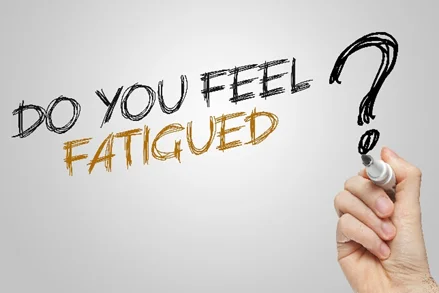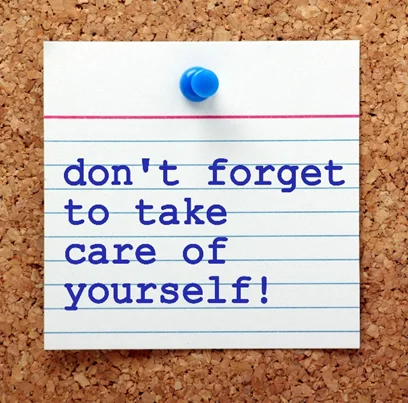FATIGUE

Fatigue is a common symptom in older populations, but it is often ignored as many patients and healthcare providers assume it is a natural progression of aging
Fatigue is not just being tired or sleepy. It is a medical condition that impacts your physical and mental state and your ability to think clearly, stay motivated and do the things you enjoy.
Fatigue is characterized by a constant, unrelenting feeling of exhaustion that often develops gradually over time — is very common among the aging population.

Everyone feels tired now and then. But, after a good night's sleep, most people feel refreshed and ready to face a new day. Fatigue, on the other hand, is a more long-term, all-encompassing condition and involves both physical and mental exhaustion.
Physical Symptoms of Fatigue
- Muscle pain
- Sleepiness
- Headache
- Vision problems
- Bloating
- Constipation
- Diarrhea
- Weight loss
Mental symptoms of fatigue
Mental fatigue may involve feeling depressed or have trouble concentrating or remembering things. In other words, whereas physical fatigue involves not having enough physical strength or endurance to perform an activity, mental fatigue involves not having enough mental energy or motivation to do so.
- Difficulty concentrating and staying on task
- Memory problems
- Lack of motivation
- Slowed response times
- Depression
- Anxiety
- Irritability
- Mood swings

According to the National Institute on Aging, there can be several factors that may cause increased fatigue as we age.
Physical Causes Sometimes, fatigue can be the first sign that something is wrong in your body. For example, people with rheumatoid arthritis, a painful condition that affects the joints, often complain of fatigue. People with cancer may feel fatigued from the disease, treatments, or both. Many medical problems and treatments can add to fatigue. These include:
- Taking certain medications, such as antidepressants, antihistamines, and medicines for nausea and pain
- Having medical treatments, like chemotherapy and radiation, or recovering from major surgery
- Infections
- Chronic diseases like diabetes, heart disease, kidney disease, liver disease, thyroid disease, and chronic obstructive pulmonary disease (COPD)
- Untreated pain and diseases like fibromyalgia
- Anemia
- Sleep apnea and other sleep disorders
Emotional Causes Are you fearful about the future? Do you worry about your health and who will take care of you? Are you afraid you are no longer needed? Emotional stresses like these can take a toll on your energy. Fatigue can be linked to many conditions, including:
- Anxiety
- Depression
- Grief from loss of family or friends
- Stress from financial or personal problems
- Feeling that you no longer have control over your life
- Not getting enough sleep can also contribute to fatigue. Regular physical activity can improve your sleep. It may also help reduce feelings of depression and stress while improving your mood and overall well-being. Yoga, meditation, or cognitive behavioral therapy could also help you get more rest. Talk with your doctor if your mental well-being is affecting your sleep or making you tired.
Lifestyle Habits Some lifestyle habits can make you feel tired. Here are some things that may be draining your energy:
- Staying up too late. A good night's sleep is important to feeling refreshed and energetic. Try going to bed and waking up at the same time every day.
- Having too much caffeine. Drinking caffeinated drinks like soda, tea, or coffee late in the day can keep you from getting a good night's sleep. Limit the amount of caffeine you have during the day and avoid it in the evening.
- Drinking too much alcohol. Alcohol changes the way you think and act. It may also interact with your medicines.
- Eating junk food. Say "no thanks" to food with empty calories, like fried foods and sweets, which have few nutrients and are high in fat and sugars. Choose nutritious foods to get the energy you need to do the things you enjoy.
- Getting too little or too much exercise. Regular exercise can boost your energy levels, but don’t overdo it.
Can boredom cause fatigue? Being bored can make you feel tired. That may sound strange, but it’s true. If you were very busy during your working years, you may feel lost about how to spend your time when you retire. When you wake up in the morning, you may see long days stretching before you with nothing planned. It doesn’t have to be that way.
Engaging in social and productive activities that you enjoy, like volunteering in your community, may help maintain your well-being. Think about what interests you and what skills or knowledge you have to offer and look for places to volunteer.

How to Prevent Fatigue in Seniors
The best way to prevent fatigue is to follow healthy habits on a daily basis. This includes:
Diet. Eating nutritiously and drinking enough water are both essential to an overall healthy lifestyle. Eating numerous smaller meals throughout the day, since they’ll have a consistent source of energy. People over 50 are more likely to experience nutrient deficiencies — especially vitamins B12 and D, iron and folic acid — that cause fatigue.
Exercise. It sounds counterintuitive, but if your loved one leads a relatively sedentary lifestyle, exercising more could help them feel less fatigued. This is inpart because a lack of exercise leads to muscle loss, which can make it more difficult to perform routine tasks. Exercise can also provide energy and improve your loved one’s mood. If you have not been active for a while, though, be sure to ask a doctor, physical therapist, or sports therapist before they attempt a new workout.
Stress-relieving techniques. People often find that mindfulness practices and exercises such as yoga and tai chi help them feel less stressed. Planning enjoyable activities could also help you socialize and feel happier and more fulfilled, thereby lowering your risk of developing anxiety or depression.